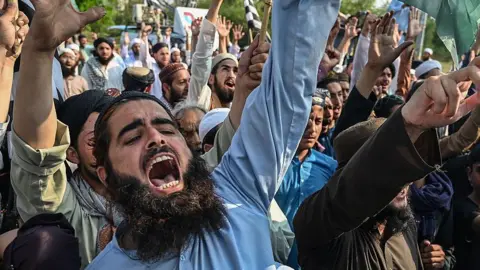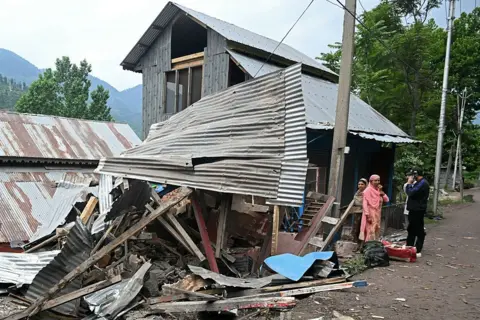How can India and Pakistan find a way to de-escalate?
 AFP via Getty Images
AFP via Getty ImagesAs the continuing India-Pakistan crisis takes a dangerous turn, nations around the world are urging calm.
The initial thinking was that after India launched air strikes, and with Pakistan claiming to have shot down several Indian jets - a claim Delhi has not confirmed - both sides could claim "victory" and de-escalate.
But there's a danger that any protracted tit-for-tat attacks could lead them to a far more damaging prospect.
During past conflicts, such as in 2019 and 2016, it was the United States and a few other global powers that put pressure on Delhi and Islamabad to bring the situation under control and de-escalate.
Now passions are running high and the nationalist rhetoric has reached a crescendo on both sides. The neighbours are closer to war than in recent decades.
- Kashmir: Why India and Pakistan fight over it
- What we know about India's strikes on Pakistan and Pakistan-administered Kashmir
“The World community is keeping quiet; that’s dangerous,” Ayesha Siddiqa, a Pakistani academic who is a senior fellow at King’s College London.
“Though the flare up has been happening for decades, this is the first time the two countries find themselves in a conflict without anyone monitoring them or forcefully telling them to stop,” she said.
Unless Washington gets more involved, Islamabad and Delhi may continue with their accusations and counter-accusations.
Although US Secretary of State Marco Rubio has been telling the senior leaders of India and Pakistan to de-escalate, the message from other American leaders is different.
US Vice-President JD Vance has said that a potential war between India and Pakistan would be "none of our business" during an interview with Fox News.
"We want this thing to de-escalate as quickly as possible. We can't control these countries, though," Vance said.
Vance was on a visit to India when the militant attack in Indian-administered Kashmir, which killed 26 civilians, took place.
US President Donald Trump had earlier called rising tension between India and Pakistan a "shame".
 AFP via Getty Images
AFP via Getty ImagesDuring previous India-Pakistan skirmishes, for example in 2019, tension was defused quickly after India carried out what it called “surgical strikes” on what it called terrorist camps inside Pakistan.
One Indian military jet was shot down in the aftermath of the crisis and the pilot was captured by Pakistan. He was released two days later after reported intervention from Washington and other world powers.
But the intensity of the current conflict is different and passions are running high on both sides.
While the Trump administration’s priorities are more about tariffs, China and Ukraine-Russia, it may require a concerted attempt by the international community to lower tension between the two nuclear-armed rivals.
The other world power which has a stake in South Asia is China. Beijing has close economic and military ties with Islamabad. It has invested more than $50bn (£37.5bn) in Pakistan as parts of its China-Pakistan Economic Corridor to boost trade.
China also has unresolved border issues with India and the two countries recently had a border clash in the Himalayan region 2020. Despite the tension, China is the second largest trading partner of India.
"If the US is uninterested [in resolving India-Pakistan tension] then other permanent members of the UN Security Council – P5 - should get involved. It is their responsibility as well," Shen Dingli, a Shanghai-based international affairs expert tells the BBC.
As India accuses Pakistan of supporting the Kashmiri separatist rebels, who carried out the deadly attack on tourists last month, the Chinese academic says "the P-5 members can launch a credible investigation into the incident", to address India's concerns.
Gulf states like Qatar, Saudi Arabia and the United Arab Emirates, which have close ties to both the countries, could step up their mediation efforts.
Saudi Arabian Minister of State for Foreign Affairs Adel Al-Jubeir arrived in Delhi on 7 May in what was seen as a surprise visit amid the backdrop of a spike in tensions between India and Pakistan.
“A good meeting with Adel Al-Jubeir," Indian Foreign Minister Subrahmanyam Jaishankar said, adding that his counterpart “shared India’s perspective on firmly countering terrorism”.
The Saudi minister arrived in Islamabad on Friday for talks with Pakistan's leaders.
There are an estimated 2.6 million Pakistanis living and working in the Gulf Kingdom. Riyadh has considerable influence in Pakistan.
Saudi Arabia has loaned billions of dollars to Pakistan to bail out the country during economic crises over the years.
One way out of the current crisis could be a situation where both sides can claim victory to satisfy their audience.
Delhi says the missile strikes on suspected militant hideouts inside Pakistan and Pakistan-administered Kashmir were part of a commitment to hold “accountable” those responsible for the last month’s attack in Pahalgam.
“India has already said it has achieved its objectives. Now, the ball is in Pakistan’s court. If they wish to retaliate then that would elicit a strong response from India,” retired Indian Lt Gen D S Hooda said.
For Pakistan, especially for its powerful military, it would want to show its people that it can stand up against India and teach it a lesson once again by downing five of the Indian air force jets during a dog fight.
India has not acknowledged the loss of any of its fighter jets in the current skirmish.
But according to Pakistani academic Siddiqa, how the current crisis ends depends on what India’s stated objectives are.
“India’s goal posts keep changing day by day – from punishing Pakistan to attaining something more,” she said.
